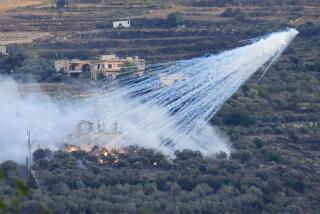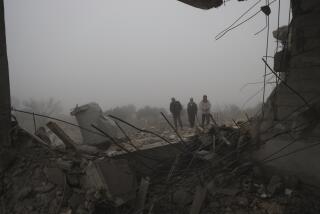Ghastly Weapon
- Share via
Four times since 1984 the United Nations has condemned Iraq for using outlawed chemical weapons in its war with Iran. Each time Iraq’s response has been to deny the charge and to ignore the condemnation. Now, so convincing evidence indicates, Iraq has again resorted to poison-gas attacks. This time the main victims have been hundreds and perhaps thousands of its own civilians.
The attack took place in northeastern Iraq on a town called Halabja, home to thousands of the 3.5 million Kurds who make up nearly 20% of Iraq’s population. The Kurds have long been in rebellion against central authority. Some have apparently been fighting as guerrillas alongside Iranian forces. Last week Iranian Revolutionary Guards captured Halabja in a surprise attack. Not long after that, Iran says, Iraqi warplanes attacked the town with chemical weapons. Western correspondents who were taken to the scene some days later saw scores of unburied corpses--mostly women, children and old men. None of them had visible wound marks. Any Iranian military casualties had presumably been removed before the reporters arrived.
Iraq is believed by Western intelligence agencies to have the largest stockpile of chemical weapons in the region, including both poison and nerve gases that it produces itself. Iran is also thought to have its own less sophisticated chemical-warfare capability--mainly mustard and phosgene gases that are relatively easy to manufacture from readily obtainable industrial components. In addition, Iran may be getting chemical weapons from Syria--its closest ally in the region and the Soviet Union’s principal Arab client. The State Department thinks that Iran may already have used its chemical weapons against Iraq.
In war, the anomalous can all too easily evolve into the commonplace. Since 1925 the use of chemical weapons has been banned by international agreement because these weapons kill indiscriminately and on a mass scale. Moral compunctions aside, there are only two ways to make this ban work. One is self-interest based on the risk of inviting tit-for-tat reprisal. The other is fear that painful international punishment will be inflicted on the ban’s violator. Iraq’s behavior over the last four years suggests that it doesn’t take the first of these possibilities very seriously, and that it regards the second with contempt.
More to Read
Sign up for Essential California
The most important California stories and recommendations in your inbox every morning.
You may occasionally receive promotional content from the Los Angeles Times.













